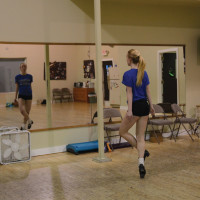A man screamed at a maid to silence her. Another man threatened to beat and humiliate the woman if she continued talking. At another point, a woman was bent over a table by a man who then forced himself on top of her, pinning her wrists to her ears.
It sounds like a scene from an episode of NBC’s Law & Order: SVU. But it’s not; it’s from Grant High School’s latest theater production, Tartuffe.
The play, billed as a satiric comedy, was written by Molière and originally premiered in the 1660s. As was the case with many of the playwrights from the time, Molière didn’t spare women from abuse in his works.
But after watching the show on its opening night at Grant, two questions have stuck in my head. Why did our theater department decide to put on a play that portrays such acts against women as comedy? And if we’re going to put this kind of theater front and center, isn’t there a responsibility on the part of everyone involved – the actors, the director and even school administrators – to educate the community?
This is high school. We’re supposed to be here to learn not just what’s in the textbooks. School experiences are supposed to go deeper than that. So shouldn’t we be making the most of an opportunity to foster a discussion and teach about relevancy given what’s going on in the world today around how women are treated?
Initially, I went to the play to see the theater department’s latest show. Some of my colleagues on the magazine were in the play and I wanted to see the result of their hard work.
But as the play went on, I grew concerned. In one scene, a lead male actor relentlessly pursued a woman for sex. She refused his overtures but he continued. It made me think about what students are taught – in both high school and college – how “No” means no.
When another male character spoke to a woman who interrupted him and said, “Thou art a maid to be stripped and flayed,” I was outraged.
The audience laughed along, but as a young woman, I felt alienated. I searched every page in the program for any hint of discussion, but came up empty. I waited for something to play out after the curtains closed, thinking there might be a discussion. Nothing. I even asked some cast members if there were any discussions behind the scenes, but it seems next to nothing was said.
For me, sexual assault is nothing to joke about. Not at a time where locally it is estimated that 1 out of 5 female students at the University of Oregon have been sexually assaulted; where nationally 44 percent of all sexual assault and rape victims in the United States are under the age of 18 – with 16 to 19 year olds being four times as likely to experience such violence; and where globally, 230 girls are still missing from their homes in Nigeria after being kidnapped and presumably sold as sex slaves.
Don’t get me wrong – I’m not asking to censor a play or insisting that the theater department get approval from the masses to put on a production. But I am about taking responsibility. If you put on a play like this, it demands further discussion. In my interviews, people connected to the play say the women in Tartuffe are the true heroes because of their wits. But they’re missing the point. If we don’t use things like Tartuffe as a learning opportunity, how can we expect things to change?
It would’ve made a difference even if someone had mentioned at the beginning or the end of the play how sexism affects our lives today. Maybe there should’ve been a dialogue between the cast and the audience scheduled to open up the conversation and address these sensitive topics.
Discussion, in my view, always brings awareness rather than shutting down the conversation.
But I’ll admit, it’s difficult for me to think of the Grant theater department as progressive. As someone who’s spent four years here watching, I’ve been disappointed in the lack of diversity. Tartuffe was another blow.
It saddens me that we haven’t talked about the issues around us. If there’s any hope of overcoming them, we need to come together as a community. We need to figure out solutions rather than disguising the problems with 17th century humor. ◊




